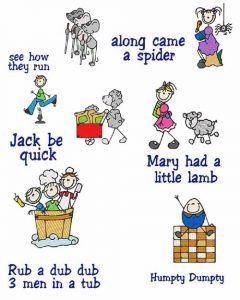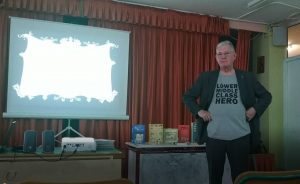Nursery Rhymes are poems or rhymes for children that tell little stories, sometimes strange, whose meaning is lost in history (going back in the early 18th century!); they are sometimes padded out with nonsense words. Some of the rhymes are simply recited like poems but a great many of them are in fact songs. Nursery rhymes are catchy, easy to memorize and fun!
That’s what makes them an invaluable educational tool. Younger students will enjoy the songs and rhymes, while older students will appreciate the themes hidden below the surface.
Nursery rhymes can be useful in many ways. Depending on the nursery rhyme, students will learn new vocabulary.
Nursery rhymes also help develop phonemic awareness (thanks to the rhyming words). These little rhyming ditties also give students the chance to practice pronunciation and intonation when they recite them. The singsong nature of these poems can create a fun, less formal environment for students. Since most nursery rhymes contain several rhyming words, they have the added advantage of helping children develop their memory (they are so easy to memorise!)
Here is a wonderful presentation ( Nursery Rhymes presentation) of a wonderful talk given by a wonderful person on several occasions (TESOL Macedonia-Thrace, TESOL Greece, Ekadeve), Mr David Gibson *!
And a short but very enlightening interview on the multiple advantages of using nursery rhymes in teaching!
Here is a list of sites you can visit to get a more thorough insight into Nursery Rhymes:
- https://www.mfiles.co.uk/nursery-rhymes-and-childrens-songs.htm
- https://www.mamalisa.com/
- https://allnurseryrhymes.com/
- http://www.kizclub.com/nursery.htm
- https://learnenglishkids.britishcouncil.org/songs
- http://www.reading-with-kids.com/nursery-rhymes.html
- http://www.learnarhyme.com/
- http://www.rhymes.org.uk/
- https://bussongs.com/
*David Gibson was born in Northern England in 1947 and began teaching in 1964. His five diplomas were awarded by the universities of Nottingham, Bristol, and Cambridge and he taught in England in junior and secondary schools for 15 years. He came to Greece in 1979 and taught English as a Foreign Language in private schools before joining the British Council in Thessaloniki in 1987. There, he taught English Language and Literature, was a Teacher-Trainer, and served as the Coordinator of Student Social and Cultural Activities.
In 1995, he took up a post as teacher of English Language and Literature at Pinewood International Schools, Thessaloniki, becoming the Chairman of the English Department in 1999. At Pinewood, he also coached three football teams, ran Guitar Clubs and School Bands, and was involved in a wide variety of other school activities and events.
David has worked for Cambridge ESOL for more than twenty years, as an Oral Examiner, Team Leader, Supervisor, Seminar Presenter, and Inspector, and is a founder and three-time board member of TESOL Macedonia-Thrace, Northern Greece, being a regular speaker and active participant in conventions and similar events.
In June 2008, he retired from full-time teaching in order to concentrate on other projects, but has continued to work with Pinewood students – coaching football, playing guitar with them, encouraging them to read and to write … and to watch birds.
You can see some of his inspiring work as the one half of the two-man English Teaching Theatre Group “Dave’n’Luke” here:
DAVE’N’LUKE English Language Theatre




